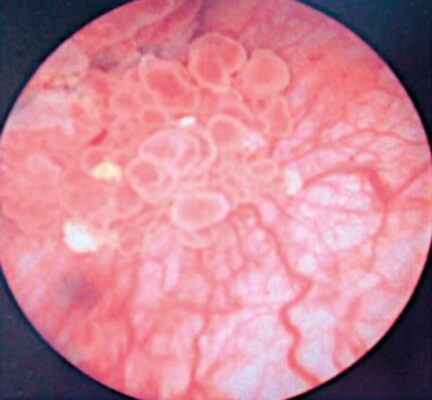Bladder cancer occurs in the tissues of the bladder, which is the organ in the body that holds urine. There are around 10,200 new bladder cancer cases in the UK every year, that’s 28 every day (2014-2016).
Bladder cancer
Bladder cancer is the 10th most common cancer in the UK accounting for 3% of all new cancer cases(2016).
In females in the UK, bladder cancer is the 15th most common cancer, with around 2,800 new cases in 2016.
Types of bladder cancer
There are three types of bladder cancer but the most common is Transitional cell carcinoma.
Transitional cell carcinoma
This begins in the transitional cells in the inner layer of the bladder. Transitional cells are cells that change shape without becoming damaged when the tissue is stretched.
Other rarer types are:
Squamous cell carcinoma and Adenocarcinoma
What are the symptoms of bladder cancer?
Many people with bladder cancer can have blood in their urine but usually no pain while urinating. There may be a number of other symptoms like fatigue, weight loss and bone tenderness.
You should pay particular attention to the following symptoms:
-blood in the urine
-pain on urinating
-needing to pee more frequently than normal
-urgency
-sometimes leaking
-Pain in the lower abdomen or lower back
What causes bladder cancer?
The exact cause of bladder cancer is unknown. Like all other cancers there are abnormal cells that grow and multiply quickly which invade other tissues.
Risk Factors?
Smoking increases your risk of bladder cancer. Smoking causes half of all bladder cancers in men and women. The following factors also increase your risk of developing bladder cancer:
- exposure to cancer-causing chemicals such as textiles, dyes etc
- chronic bladder infections
- low fluid consumption
- being male
- being white
- Age- as most cases occur in people over the age of 55
- eating a high-fat diet
- any family history of bladder cancer
- having previous treatment with a chemotherapy drug called Cytoxan
- having previous radiation therapy to treat cancer in the pelvic area
How is bladder cancer diagnosed?
Your doctor may diagnose bladder cancer using one or more of the following methods:
- a urinalysis
- an internal examination, which involves your doctor inserting gloved fingers into your vagina or rectum to feel for lumps that may indicate a cancerous growth
- a cystoscopy, which involves your doctor inserting a narrow tube that has a small camera on it through your urethra to see inside your bladder
- a biopsy in which a small instrument is inserted through the urethra to take a tissue sample to test
- a CT scan to view the bladder
- an intravenous pyelogram(IVP)
- X-rays
Your doctor can rate bladder cancer with a staging system that goes from stages 0 to 4 to identify how far the cancer has spread. The stages of bladder cancer mean the following:
- Stage 0 bladder cancer has not spread past the lining of the bladder.
- Stage 1 bladder cancer has spread past the lining of the bladder, but not reached the layer of muscle in the bladder.
- Stage 2 bladder cancer has spread to the layer of muscle in the bladder.
- Stage 3 bladder cancer has spread into the tissues that surround the bladder.
- Stage 4 bladder cancer has spread past the bladder to the neighbouring areas of the body.
How is bladder cancer treated?
Your doctor will work with you to decide what treatment to provide based on the type and stage of your bladder cancer, your symptoms, and your overall health.
Treatment for stage 0 and stage 1
Treatment for stage 0 and stage 1 bladder cancer may include surgery to remove the tumour from the bladder, chemotherapy, or immunotherapy, which involves taking a medication that causes your immune system to attack the cancer cells.
Treatment for stage 2 and stage 3
Treatment for stage 2 and stage 3 bladder cancer may include:
- removal of part of the bladder in addition to chemotherapy
- removal of the whole bladder, which is a radical cystectomy, followed by surgery to create a new way for urine to exit the body
- chemotherapy, radiation therapy, or immunotherapy that can be done to shrink the tumour before surgery, to treat the cancer when surgery isn’t an option, to kill remaining cancer cells after surgery, or to prevent the cancer from recurring
Treatment for stage 4 bladder cancer
Treatment for stage 4 bladder cancer may include:
- chemotherapy without surgery to relieve symptoms and extend life
- radical cystectomy and removal of the surrounding lymph nodes, followed by a surgery to create a new way for urine to exit the body
- chemotherapy, radiation therapy, and immunotherapy after surgery to kill remaining cancer cells or to relieve symptoms and extend life
- clinical trial drugs
What is the outlook for people with bladder cancer?
Your outlook depends on the type and stage of cancer.
Recent research in USA shows the five-year survival rates by stage are the following:
- The five-year survival rate for people with stage 0 bladder cancer is around 98 %
- The five-year survival rate for people with stage 1 bladder cancer is around 88 %.
- The five-year survival rate for people with stage 2 bladder cancer is around 63 %
- The five-year survival rate for people with stage 3 bladder cancer is around 46%.
- The five-year survival rate for people with stage 4 bladder cancer is around 15%
There are treatments available for all stages. Speak with your doctor about any questions or concerns you may have regarding your diagnosis and treatment.
Prevention
As the cause of bladder cancer, is not known it is hard to tell how to prevent it.
You can reduce the risk of getting bladder cancer if you stop smoking, drink plenty of water and avoid carcinogenic chemicals.



